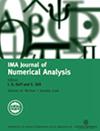On the convergence of classical and multilevel variants of the Uzawa and Arrow–Hurwicz algorithms related to the LBB condition
IF 2.4
2区 数学
Q1 MATHEMATICS, APPLIED
引用次数: 0
Abstract
In this paper we propose a systematic study of classical and multilevel variants of the Uzawa and Arrow–Hurwicz methods. The multilevel methods are obtained from the classical ones by the introduction of multilevel inner iterations to calculate the solution of the first equation instead of its exact calculation as in the classical Uzawa or Arrow–Hurwicz methods. In our study, an essential role is played by the LBB condition. For classical and multilevel variants of the Uzawa and Arrow–Hurwicz algorithms, we prove theorems which give the convergence conditions of the methods and explicit formulas of the convergence rates. On the basis of these results we compare the convergence conditions and the convergence rates of the classical methods with those of their corresponding ones in the multilevel methods. Concerning the Uzawa methods, we prove that, the limit of the convergence condition and the convergence rate of the multilevel method, when the number of the inner iterations tends to infinity, coincide with those of the classical one. Also, from the dependence of the convergence rate on the number of inner iterations of the multilevel method, we conclude that, the multilevel method with a small number of inner iterations converges better than the classical one. For the Arrow–Hurwicz methods we found that for a large number of inner iterations of the multilevel algorithm, the convergence condition of the multilevel method coincides with that of the classical method and the convergence rate of the multilevel method is equal to or smaller than that of the classical method. Finally, the behavior of the introduced methods is investigated by numerical experiments carried out for the driven-cavity Stokes problem and they confirm the theoretical results.关于与LBB条件相关的Uzawa和Arrow-Hurwicz算法的经典和多层变体的收敛性
本文对Uzawa方法和Arrow-Hurwicz方法的经典和多级变体进行了系统的研究。多层方法是在经典方法的基础上,通过引入多层内迭代来计算第一个方程的解,而不是像经典的Uzawa或Arrow-Hurwicz方法那样精确计算第一个方程的解。在我们的研究中,LBB条件起着至关重要的作用。对于Uzawa算法和Arrow-Hurwicz算法的经典和多层变体,我们证明了给出该方法收敛条件的定理和收敛速率的显式公式。在这些结果的基础上,我们比较了经典方法的收敛条件和收敛速度与相应的多层方法的收敛速度。对于Uzawa方法,我们证明了当内迭代次数趋于无穷时,多层方法的收敛条件和收敛速度的极限与经典方法的收敛条件和收敛速度的极限一致。同时,从多层方法的收敛速率与内迭代次数的关系可知,内迭代次数较少的多层方法收敛速度优于经典方法。对于Arrow-Hurwicz方法,我们发现对于多层算法的大量内迭代,多层方法的收敛条件与经典方法的收敛条件一致,并且多层方法的收敛速度等于或小于经典方法的收敛速度。最后,通过驱动腔Stokes问题的数值实验研究了所引入方法的性能,验证了理论结果。
本文章由计算机程序翻译,如有差异,请以英文原文为准。
求助全文
约1分钟内获得全文
求助全文
来源期刊
CiteScore
5.30
自引率
4.80%
发文量
79
审稿时长
6-12 weeks
期刊介绍:
The IMA Journal of Numerical Analysis (IMAJNA) publishes original contributions to all fields of numerical analysis; articles will be accepted which treat the theory, development or use of practical algorithms and interactions between these aspects. Occasional survey articles are also published.

 求助内容:
求助内容: 应助结果提醒方式:
应助结果提醒方式:


